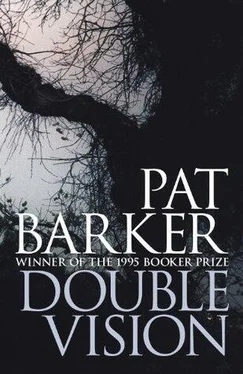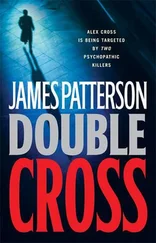Creeping along behind the hedge, Stephen did a bent-double, lung-bursting run along the path and into the kitchen garden. From here he could see the house through a gap in the hedge. The sunlight flashed on the conservatory windows, but there were no figures moving around inside. Adam had shown him where Beth kept the spare key: incredibly for an intelligent woman, she left it under a stone urn outside the conservatory door. Woodlice scrambled away in all directions as he found the small polythene envelope and took the key out. He slid it into the lock, holding his breath as it turned, praying he wouldn’t make any noise getting in. Running down the hill, he’d thought he might burst into the house shouting, ‘Police’, hoping they’d panic and run, but if they didn’t he’d have lost the element of surprise. And they might be upstairs in one of the bedrooms. It mightn’t be so easy for them to run. But he daren’t think about that. Through the door, across the black-and-white tiles, into the hall. On a table there was a bronze statue of an African man, immensely tall and thin. Stephen picked it up, held it round the legs and edged forward again. Voices, though he couldn’t catch any of the words. Deep, slow breaths. It hurt his chest to breathe like that, but he did it. Peering round the edge of the door, he saw Justine lying on the sofa, her face a mask of blood, and, only a few feet away, his back to the door, a man wearing a dark blue sweatshirt and jeans. Stephen could see short, ginger hair, the nape of a pink neck. He raised the statue, took two long strides into the room, and brought it crashing down. At the last second somebody shouted, ‘Look out’ and the man ducked, deflecting the blow on to his shoulder. Stephen felt the jar of bone breaking travel up his own arm, and then, howling, the man turned and ran.
Kneeling by the sofa, he tried to estimate the damage to Justine. Forehead cut and bruised, nose swollen, but the most worrying injuries were the cuts to her head, though she seemed comparatively unaware of them and was simply holding a hand over her eyes and nose to shield them. He tried to take her in his arms, but she was stiff and unyielding, staring round her as if she expected them to come back at any minute. He dialled 999 and asked for police and an ambulance. While he was phoning, he looked round the room. Television gone. DVD player, music centre. The mantelpiece had been swept clean, but he couldn’t remember what had been on it.
‘They’ll be here in about twenty minutes.’
‘Lock the door.’
He was about to argue that they certainly wouldn’t come back, but then he saw her expression — the staring hyper-wakeful eyes — and did as she asked. In the utility room his feet crunched on broken glass, and he saw that the small window was shattered. Then back to the living room. He found it hard to look at her face. ‘Did you lose consciousness?’
‘I think so. Or perhaps I just fainted. I don’t know.’
At least, he thought, they weren’t rapists. Of course, if they’d been watching the house — Beth had mentioned getting silent calls — they’d know it was normally empty at this time of day, so Justine walking in on them like that would have been a helluva shock.
A whoop and scream of sirens, a hammering on the front door, and suddenly the room was full of men in uniform. He saw Justine shrink back into the sofa cushions, but she seemed more dazed than frightened.
The cut-off part of Justine watched from the hall, as a girl with a cut and bruised face was examined by paramedics. There was nothing unreal about this division. She felt the harsh texture of the hall carpet under her feet.
A face leant close to hers. ‘You’d better come along to the hospital, Miss. You’ll need a few stitches in that.’
She could tell from the way he said ‘a few’ that he meant ‘a lot’. ‘I’m all right.’
‘Better be on the safe side.’
On the way out she remembered the frozen food thawing in carrier bags on the kitchen table and turned to ask Stephen to put it in the fridge, but the thought sank back into the darkness before she could speak. Standing there, wrapped in a red blanket, she groped about in her mind trying to recover it, before admitting it was gone.
Only at the last minute, climbing up the steps into the ambulance, did she remember what really mattered.
‘Ring Dad,’ she called to Stephen.
He nodded, then spoke to the driver. ‘Where are you taking her?’
‘The RVI.’
‘I’ll come as soon as I can.’
He blew a kiss. Then the doors banged shut behind her, shutting out the bright day.
After ringing Alec, who sounded winded by the news, but said he’d go to the hospital at once, Stephen settled down to be interviewed by the police. It took about an hour. He was careful to emphasize that there were two burglars, that they’d attacked Justine, that for all he knew they were armed. The broken collarbone — whatever it was — had to be accounted for. He didn’t think he was likely to be charged with assault, but he was playing safe. Stranger things had happened.
Long before the interview was over, the house was full of white-suited scene-of-crime officers, dusting grey powder everywhere. And then, in the middle of all this, Robert rang from Orly Airport and had to be told the news. ‘Is Justine all right?’ he asked.
Full marks, Robert, Stephen thought. He hadn’t even asked what was missing.
Stephen was given an incident number to pass on to Robert, the phone number of a glazier who did emergency calls, and was told to expect a visit from Victim Support. Then the young policeman snapped the elastic round his notebook and stood up. He didn’t hold out much hope of recovering anything, he said, as Stephen accompanied him to the front door, but this was aggravated burglary and they’d give it their best shot.
Shortly afterwards the chief scene-of-crime officer, a pretty, red-haired girl with a Scottish accent, popped her head round the door to say she was going too.
So he was alone, in a house he couldn’t leave till the glazier had come and fixed the window.
He went back over the story he’d told the police, and then the other story: the one he hadn’t needed to tell them because — thank God — it wasn’t relevant. Locked in his brain, though, was the truth. All the way down the hillside he’d had flashbulbs exploding in his head. So many raped and tortured girls — he needed no imagination to picture what might be happening to Justine. It would not have surprised him to find her lying like a broken doll at the foot of the stairs, her skirt bunched up around her waist, her eyes staring. Years of impacted rage had gone into the blow he’d aimed at the back of the burglar’s head. He’d meant it to kill.
He looked around him. One pool of blood in the kitchen, another in the living room, and everywhere, on every window, every door, every piece of furniture, clustering thickly round doorknobs and latches, grey fingerprints, handprints, thumbprints, everywhere, as if the house were suffering from an infestation of ghosts.
Justine had a fleeting impression of the casualty department as the ambulance men hurried her through it — a row of people sitting on a bench. Because the police were with her, she was taken immediately to a treatment room at the far end of the corridor. The policewoman withdrew. Justine was asked to undress on to paper on the floor and given a scratchy hospital robe to wear. Her clothes and the paper were scooped up and carried away. A young man came and sat beside her, asked if she’d scratched her attacker, examined her fingers and took scrapings from underneath the nails. She couldn’t remember scratching him. She looked at her hands, imagined them being bagged up as evidence and taken away.
Читать дальше












